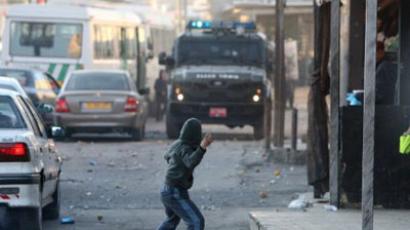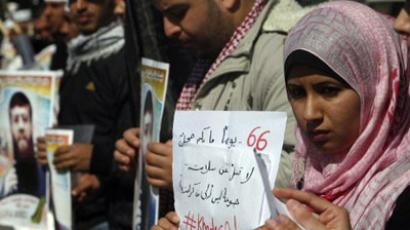Palestinians protesting economic stagnation clash with police (VIDEO)
Thousands of Palestinians clashed with police in protests over the economic stagnation caused by strict Israeli trade controls and a decline in Western aid. Officers fired tear gas and beat back protesters who had blocked roads with burning tires.
In this year’s largest display yet of public discontent with the Palestinian Authority, Palestinians across the West Bank voiced their unhappiness with recently implemented austerity measures.The most violent clashes occurred in the city of Hebron, where hundreds of youths attempted to storm a police station, pelting it with rocks. Officers in riot gear responded, beating protesters back with truncheons and tear gas.Demonstrators voiced anger over rising prices and unpaid salaries amid new austerity measures introduced by the government."Nobody is able to live, except the big officials. We have to pressure this government to change," Sami Saleh, a 57-year-old taxi driver said to AFP.The majority of public discontent was directed against Palestinian Prime Minister Salam Fayyad. Protesters in Hebron hurled shoes at a poster of the US-educated politician with the words ‘Depart Fayyad’ scrawled underneath. Activists then tore the poster down, trampled it and set it on fire.
Some protesters also called for the removal of President Mahmoud Abbas.In response to the violent clashes PM Fayyad has lowered the price of fuel. Previously, the price of petrol in Palestine was $8.18 per gallon, more than double the US $3.59 per gallon.PM Fayyad says claimed that the austerity measures were due to a budgetary shortfall caused by the failure of the US and Arab countries to deliver an expected $1.2 billion in financial aid.Washington froze financial aid to the Palestinian Authority last year after it went against US wishes and made a bid for statehood in the United Nations. Obama lifted the freeze in April, but the funds have yet to arrive.
The Palestinian Authority has been unable to pay employees’ salaries for the last few months due to the aid default. The group employs some 150,000 civil servants, who are now struggling to make ends meet in the downturn. ‘Palestine with its hands tied behind its back’Economic factors are the catalyst for the dissatisfaction with the Palestinian Authority’s “inaction” in a number of pressing matters, political analyst Elias Zananiri said in an interview with RT.
“On the level of negotiations with Israel nothing is happening, there is frustration among the Palestinians. On the level of reconciliation with Hamas nothing is happening,” Zananiri said. “Nothing is moving on.”He cited the trade disparity between Israel and Palestine as one of the root causes of the current economic woes.The Palestinians buy an estimated $5 billion in products and services from Israel, while Israel buys only $50 million from Palestine, he said.Zananiri also noted that the international community has to play an active role in bringing Israel and the Palestinians to the negotiations table.
“There is a leadership problem in Israel, the leadership today is not ready to move even one step forward,” Zananiri said, adding that if you “look at the average Palestinian on the street they see that their land is being taken over by the Israelis.”"What kind of prosperity can we expect from a Palestinian Authority that has its hands tied behind its back?” he said.















